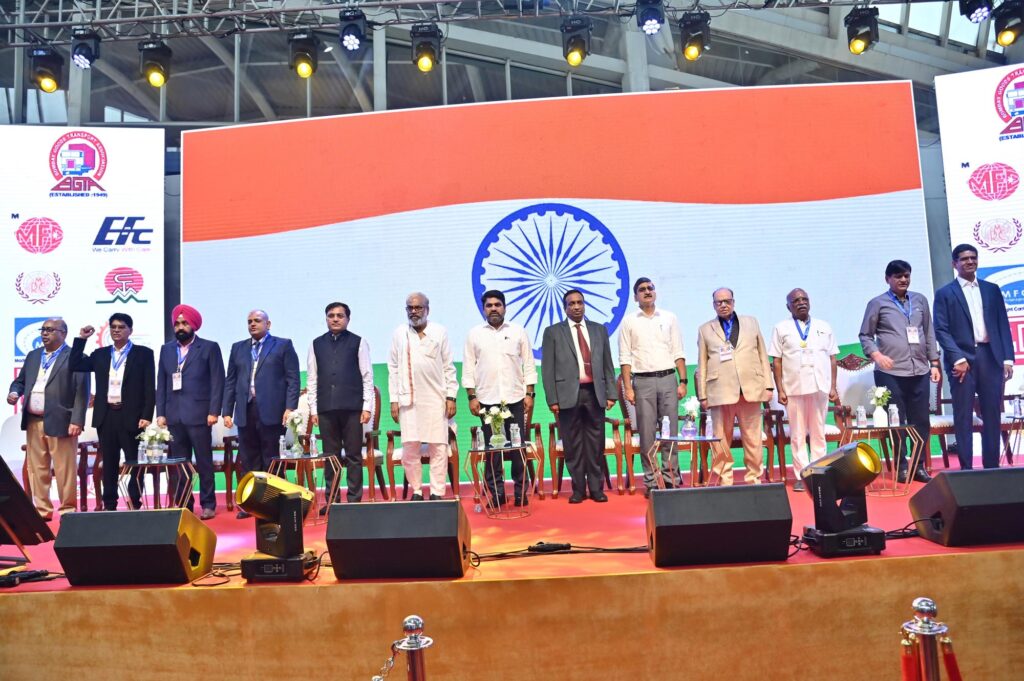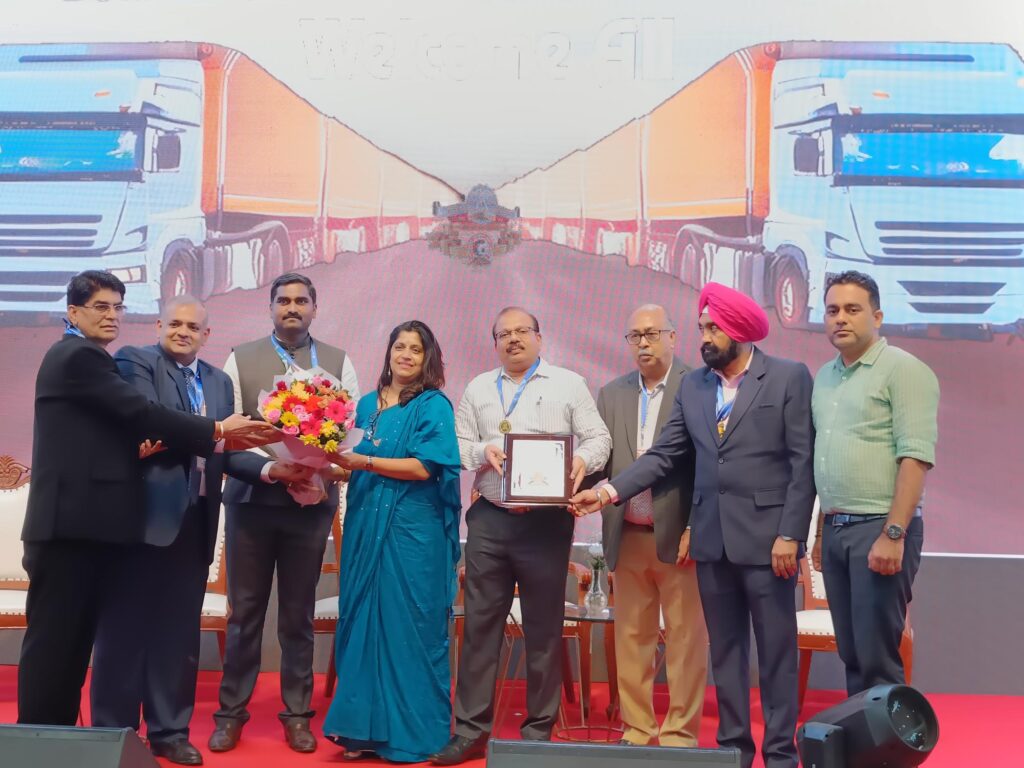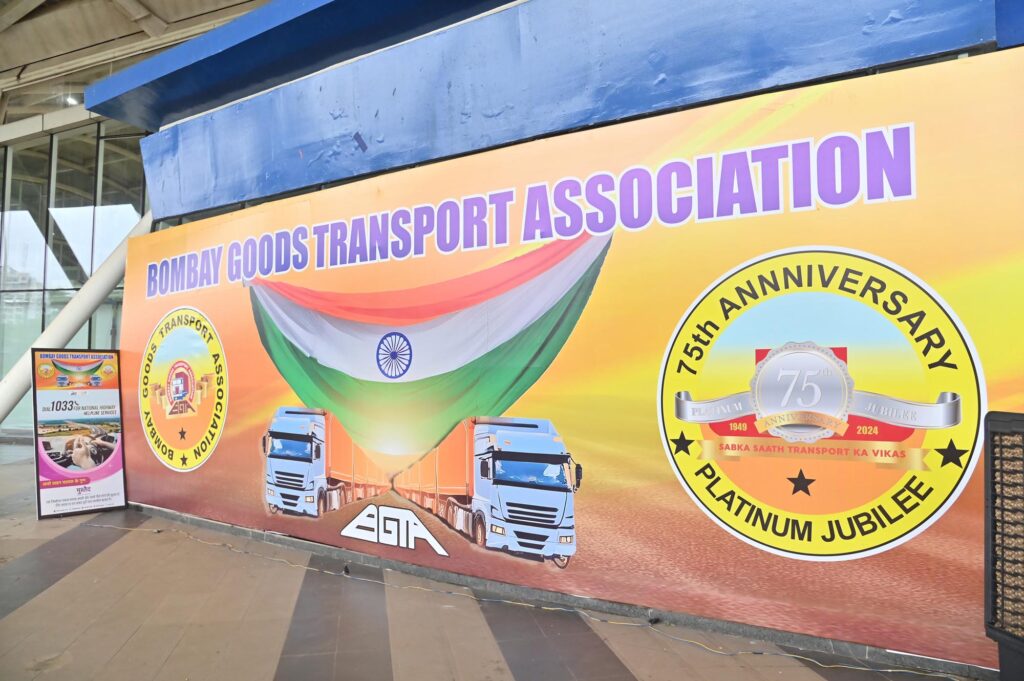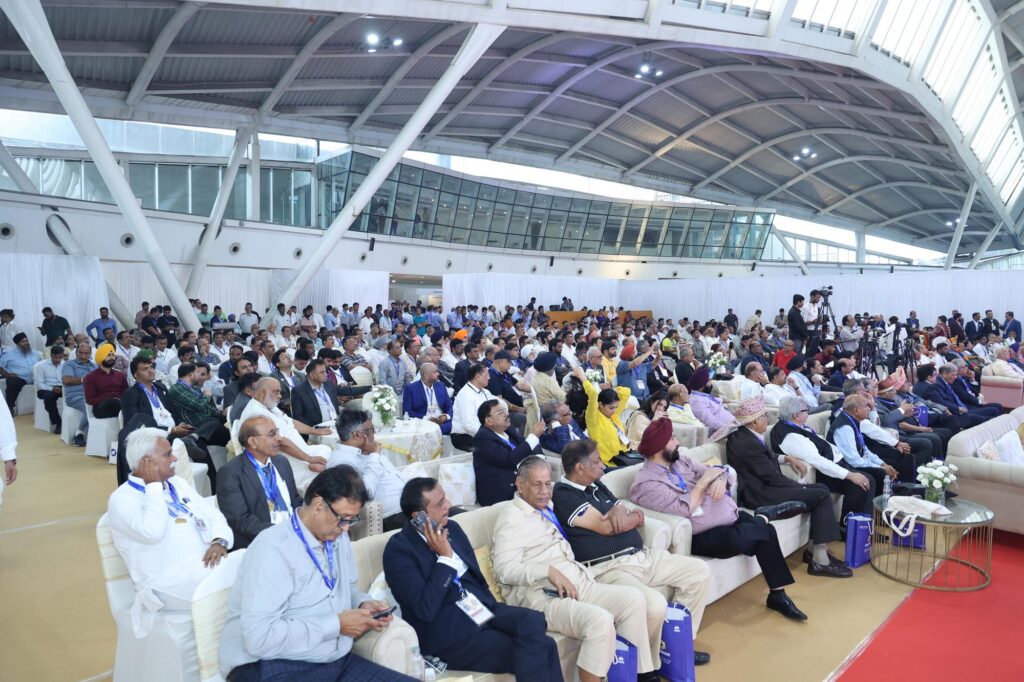
The Bombay Goods Transport Association (BGTA) recently celebrated its 75th anniversary at the CIDCO Exhibition and Convention Centre in Vashi, Navi Mumbai. The event was attended by numerous dignitaries from government and bureaucracy like Pasha Patel, Chairman of the Agricultural Price Commission and Executive Chairman of the Chief Minister’s Task Force on Environment and Sustainability, Government of Maharashtra, Satej (Bunty) D. Patil, MLC, former State Home Minister and former Transport Minister of Maharashtra, Vivek Bhimanwar, Transport Commissioner and members of the BGTA. Rajesh Rajgor, who attended the occasion brings the highlights from the show.
The Bombay Goods Transport Association (BGTA) recently marked its 75th anniversary with a grand celebration at the CIDCO Exhibition and Convention Centre in Vashi, Navi Mumbai. Founded in 1949, BGTA has grown to over 1,000 members, championing sustainability and innovation in the transport industry. The association’s continuous efforts have been instrumental in shaping the transport sector in Maharashtra and beyond.

Key discussions at the inauguration included the advocacy for allowing cleaner, fuel-efficient vehicles older than 8 years within city limits, the abolishment of check posts in Maharashtra (a practice already adopted by states like MP, Rajasthan, and Gujarat), improving road safety and vehicle uptime, and addressing the timelines related to e-challans. These topics are critical for streamlining operations and reducing delays for truckers.
The celebration featured a mini exhibition showcasing innovations from leading companies. Tata Motors presented their LNG trucks, Randhawa Motors displayed the Mahindra SUV, Axestrack showcased their digital twin solutions, and Bosch introduced its Logistics Operating System (L.OS), a comprehensive digital platform designed to optimize logistics operations by integrating various services and providing real-time data for better decision-making. Bridgestone and JK Tyres unveiled their latest tyre solutions, with Regrip attracting attention with its renewable tyres, which are both cost-effective and environmentally friendly. Taabi Mobility Ltd. highlighted its AI and IoT-enabled SaaS solutions aimed at reducing fuel costs and improving vehicle uptime, empowering businesses to identify and rectify inefficiencies in real time. Tata International Vehicle Application (TIVA) also showcased its robust trailer at the show. Gulf Oil presented its wide range of oil and lubricants for the fleet operators.
Attendees, primarily BGTA members, engaged in insightful sessions from the GST Commissioner’s office, a presentation from the Mumbai Dabbawalas, and a discourse on emotional intelligence by Dr. Farida Virani. The event also included a fireside chat with women leaders and young transporters, culminating in a live musical performance. The event not only celebrated BGTA’s rich history but also set a forward-looking agenda focused on sustainability, innovation, and inclusivity within the transport industry. The collaborative efforts of the BGTA team, its sponsors, and all participants made this milestone event a grand success.

On the sidelines of the show, Rajesh Rajgor had an interaction with Suresh Khosla, President, BGTA and Bal Malkit Singh, Chairman, Organizing Committee, Former President, AIMTC & BGTA.
Edited excerpts from Interview with Suresh Khosla President, BGTA:
As the president of BGTA, what are the main demands from the government concerning insurance, load management, vehicle health, integrated road networks, and taxation? How do you see these demands shaping the future regulatory landscape for the goods transport sector?
BGTA demands include more comprehensive insurance policies, creation of facilitating environment through a transparent tech driven enforcement, and grievance redressal system, stop misuse of e-challan system and physical enforcement, development of integrated road networks with parking facilities and basic amenities for drivers, and rationalization of taxation. These demands aim to reduce operational costs and enhance the efficiency of the goods transport sector.

What are the significant challenges currently facing the goods transport industry, such as issues related to infrastructure, regulatory compliance (GST, e-challan, etc.), or economic pressures? How is BGTA addressing these challenges to support its members?
Significant challenges include poor road infrastructure, complex GST compliance, and rising operational costs, corruption & harassment on the roads. BGTA addresses these by lobbying for better policies, providing members with compliance training, and negotiating for cost-effective solutions in fuel and maintenance.
How has BGTA promoted collaborative logistics among its members to foster a culture of learning and growth? Can you provide examples of programs or initiatives that have successfully encouraged knowledge sharing and operational collaboration?
BGTA has launched several collaborative logistics initiatives, such as shared procurement programs. We organize regular knowledge-sharing seminars and webinars where members can learn from industry experts and each other. This collaborative approach led to fostering of efficiency in the sector by implementation of best practices.

Could you provide a brief history of BGTA and elaborate on the key benefits that come with membership? How has the association evolved over the years to better serve its members?
We are pleased to introduce the Bombay Goods Transport Association (BGTA), an esteemed association of transporters in Western India, serving the industry with dedication and commitment since 1949. BGTA represents 1,382 members, including major fleet owners and logistics companies, and over 10 lacs truckers. The transport industry directly employs up to 2 crore individuals and indirectly supports around 20 crore people nationwide. BGTA was established in 1949 with a mission to represent and support the goods transport sector and we are celebrating our 75th anniversary this year.

Key benefits of membership include credibility & recognition, access to industry insights, advocacy on policy issues, networking opportunities, and training programs. Over the years, BGTA has evolved by incorporating digital tools and expanding its advocacy efforts to address modern challenges, foster best practices and infuse efficiency in the transport ecosystem.
With over 1,000 members, what is your vision for BGTA’s growth and development in the coming years? How do you plan to expand the association’s reach and influence within the goods transport sector?
The vision for BGTA includes increasing membership, enhancing digital presence, and strengthening advocacy efforts. Plans to expand reach involve launching regional chapters in every district and make it a representative State body of the Transport Fraternity of Maharashtra, increasing collaboration with international bodies, and continuously improving member services to ensure relevance and support in a dynamic industry.
Edited excerpts from Interview with Bal Malkit Singh, Chairman, Organizing Committee, Former President, AIMTC & BGTA.
What are the primary focus areas and strategic initiatives that BGTA is currently pursuing to enhance the goods transport sector in India?
BGTA is concentrating on improving awareness about changing economic, technological and regulatory environment in this sector, implementing technology for better efficiency, and advocating for policy reforms. Strategic initiatives include collaboration with government bodies to streamline logistics processes, promoting digitalization in the sector, and enhancing safety standards.
How is BGTA facilitating access to advanced products and technology for its members, specifically from global and Indian manufacturers of trucks, trailers, tyres, oil, and lubricants? Can you share specific examples of successful collaborations or initiatives in this regard?
BGTA organizes trade shows, technology fairs, and workshops to connect members with manufacturers. Successful collaborations include partnerships with leading truck manufacturers to introduce fuel-efficient models and tie-ups with tyre companies to provide advanced, durable tyres at discounted rates, conducting workshops and tie-ups with companies and the members for efficient use of data analytics for better decision making.
BGTA actively engages with various governmental departments on policy matters. Could you elaborate on the recent policy changes or advocacy efforts led by BGTA that have positively influenced the goods transport sector? What are the key policy areas where BGTA is seeking further reform?
Recent successes include lobbying for GST simplifications and E-way bill amendments to ease compliance. BGTA is currently pushing for reforms in toll taxation, abolition of border check posts in Maharashtra, Avoiding misuse of E-challan, Development of Truck Terminals, Parking Facilities and better road infrastructure and basic amenities policies. They have also been instrumental in negotiating for subsidies on fuel and lubricants.
One of BGTA’s roles is to address the daily grievances of its members with local and state authorities. What are the most common issues faced by your members, and how effectively has BGTA been able to resolve them?
Common issues include regulatory compliance, toll disputes, and penalties for minor overload at border check posts due to discrepancy in weighment calibration, expiration of e-way bill. BGTA has established a grievance redressal cell that works closely with authorities to address and resolve these issues promptly, ensuring smoother operations for its members.
How does BGTA promote safety and compliance within the goods transport industry, and what measures have been implemented recently to ensure the welfare of its members and their employees?
BGTA conducts regular training programs on safety protocols and compliance standards. They have recently launched health and accident insurance schemes to ensure the welfare of members and their employees. Further, it has also tied up with lawyered on demand for providing legal help on the go.